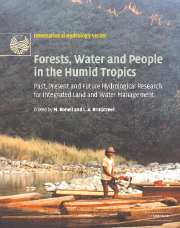 Forests, Water and People in the Humid Tropics
Forests, Water and People in the Humid Tropics from Part I - Current trends and perspectives on people–land use–water issues
Published online by Cambridge University Press: 12 January 2010
FOREST DWELLERS AND FORESTS
Until the latter part of the nineteenth century, most people living in the world's moist tropical forests were almost completely dependent on forestland and resources for food, shelter, medicine and trade products. Small groups typically claimed use rights over a specific area of forest and controlled access to agricultural plots and forest resources through customary law reinforced, in many cases, by religious restrictions. Most forest dwellers were isolated physically from the outside world by distance and natural barriers. They lived at or beyond the periphery of modern society and the market economy. The outside world had little interest in these people or forest resources, with the exception of a few high-value non-timber forest products (NTFPs) and timber species, some of which were traded for centuries.
The isolation that shaped interactions between forest dwellers and tropical forests began to be undermined when national governments and colonial powers extended their power into forested hinterlands; frequently accompanied by laws that shifted legal control of forestland and resources to the state (Poffenberger, 1999; Brookfield et al., 1995). The super-imposition of formal tenure systems over traditional tenure had little initial impact on the lives of most forest dwellers because governments lacked the resources needed to enforce these laws and, in any case, there were few forest resources valuable enough to justify commercial exploitation.
To save this book to your Kindle, first ensure [email protected] is added to your Approved Personal Document E-mail List under your Personal Document Settings on the Manage Your Content and Devices page of your Amazon account. Then enter the ‘name’ part of your Kindle email address below. Find out more about saving to your Kindle.
Note you can select to save to either the @free.kindle.com or @kindle.com variations. ‘@free.kindle.com’ emails are free but can only be saved to your device when it is connected to wi-fi. ‘@kindle.com’ emails can be delivered even when you are not connected to wi-fi, but note that service fees apply.
Find out more about the Kindle Personal Document Service.
To save content items to your account, please confirm that you agree to abide by our usage policies. If this is the first time you use this feature, you will be asked to authorise Cambridge Core to connect with your account. Find out more about saving content to Dropbox.
To save content items to your account, please confirm that you agree to abide by our usage policies. If this is the first time you use this feature, you will be asked to authorise Cambridge Core to connect with your account. Find out more about saving content to Google Drive.